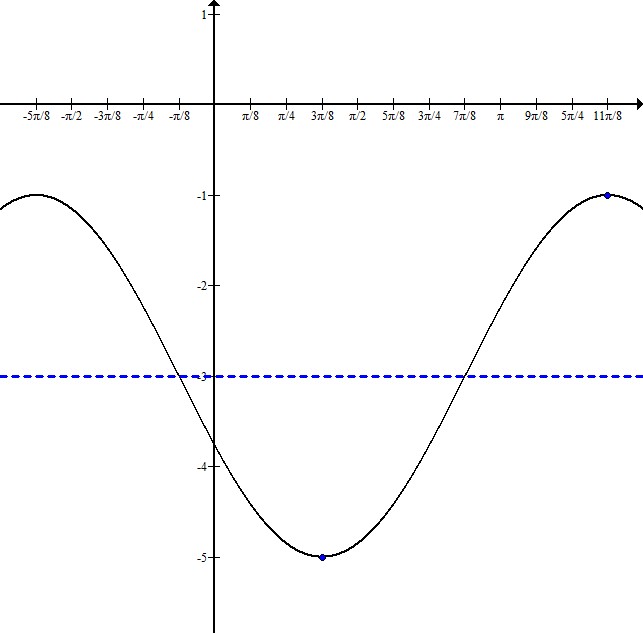All Precalculus Resources
Example Questions
Example Question #5 : Find The Period Of A Sine Or Cosine Function
What is the period of this sine graph?

The graph has 3 waves between 0 and 


Example Question #6 : Find The Period Of A Sine Or Cosine Function
Write the equation for a cosine graph with a minimum at 

The equation for this graph will be in the form 
To write this equation, it is helpful to sketch a graph:

From sketching the maximum and the minimum, we can see that the graph is centered at 
The distance between the maximum and the minimum is half the wavelength. Here, it is 

The minimum occurs in the middle of the graph, so to figure out where it starts, subtract 
This graph's equation is

Example Question #7 : Find The Period Of A Sine Or Cosine Function
Give the period and frequency for the equation 
Period: 
Period: 
Period: 
Period: 
Period: 
Period: 
Our equation is in the form 
where A is the amplitude, f is the frequency, h is the horizontal shift, and k is the vertical shift.
We can look at the equation and see that the frequency, 

The period is 

Example Question #8 : Find The Period Of A Sine Or Cosine Function
What is the period of the graph 
The equation for this function is in the form 
where A is the amplitude, f is the frequency, h is the horizontal shift, and k is the vertical shift.
By looking at the equation, we can see that the frequency, 

The period is 

Example Question #9 : Find The Period Of A Sine Or Cosine Function
What could be the function for the following graph?
What could be the function for the following graph?
Begin by realizing we are dealing with a periodic function, so sine and cosine are your best bet.
Next, note that the range of the function is 

From this information, we can find the amplitude:
So our function must have a 
Also, from the point 
The only remaining obstacle, is whether the function is sine or cosine. Recall that sine passes through 

Thus, our answer is:
Example Question #881 : Pre Calculus
What is the amplitude of 
For any equation in the form 

In this case, 


Example Question #61 : Graphs And Inverses Of Trigonometric Functions
What is the amplitude of 
The formula for the amplitude of a sine function is 

In our function, 
Therefore, the amplitude for this function is 
Example Question #882 : Pre Calculus
Find the amplitude of the following trig function:
Rewrite 
The absolute value of 
Example Question #53 : Graphing The Sine And Cosine Functions
Find the amplitude of the function.
For the sine function

the amplitude is given as 
As such the amplitude for the given function


Example Question #2 : Period And Amplitude
Which of the given functions has the greatest amplitude?
The amplitude of a function is the amount by which the graph of the function travels above and below its midline. When graphing a sine function, the value of the amplitude is equivalent to the value of the coefficient of the sine. Similarly, the coefficient associated with the x-value is related to the function's period. The largest coefficient associated with the sine in the provided functions is 2; therefore the correct answer is 
The amplitude is dictated by the coefficient of the trigonometric function. In this case, all of the other functions have a coefficient of one or one-half.
Certified Tutor
Certified Tutor
All Precalculus Resources




























































